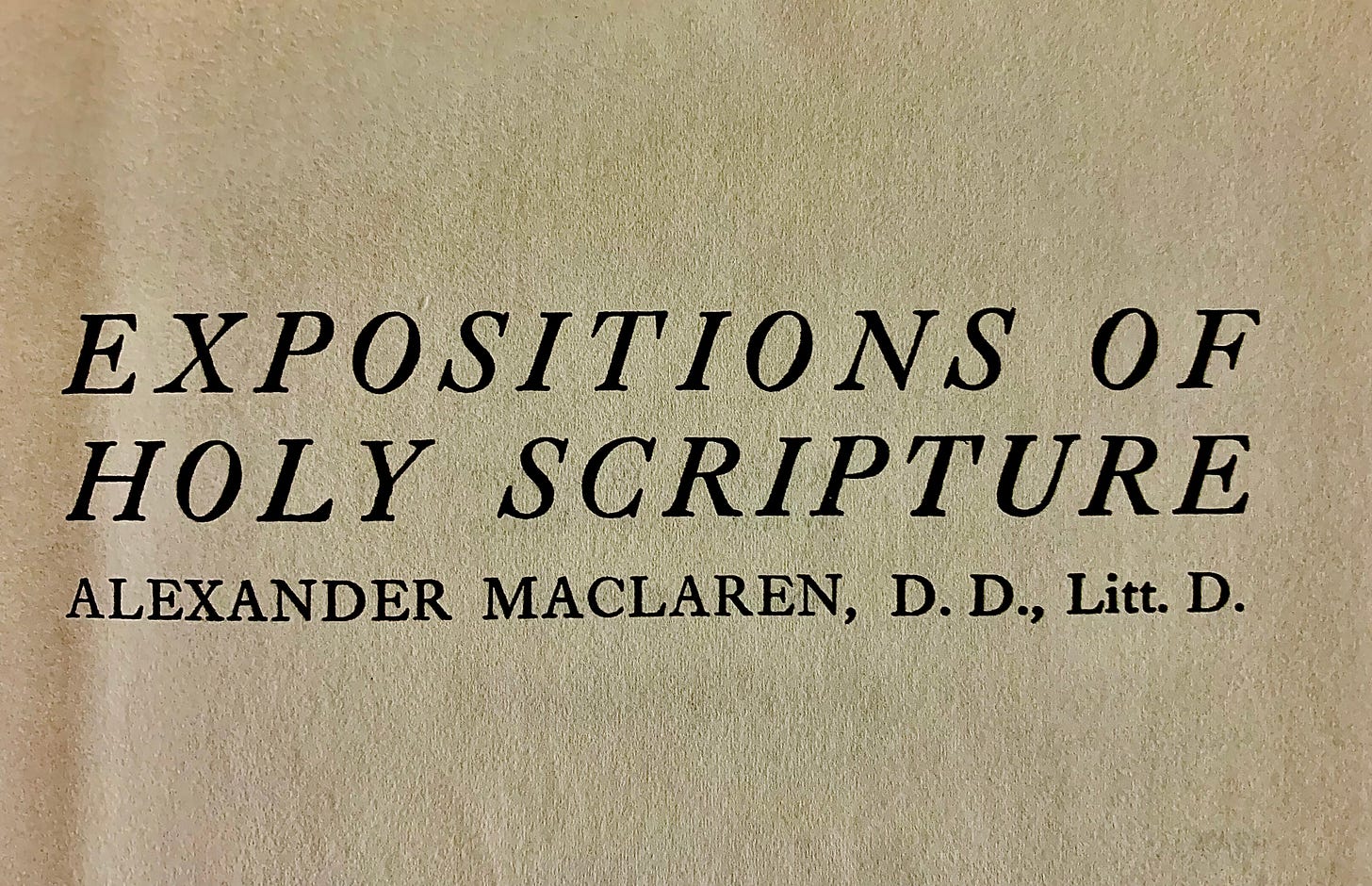Old Truths Reiterated
Am I repeating myself?
"Finally, my brothers, rejoice in the Lord. To write the same things to you is no trouble for me and is safe for you." (Philippians 3:1 ESV)
Right now I am a young pastor, and I am relatively new at preaching. I am only about 20 sermons in on a journey that I plan to continue for the rest of my life. I feel like I am still at the trailhead, I'm still putting on my boots, and I'm staring into a dense wood. It has already become the most exciting adventure of my life. Paul tells Titus, “proclaim these things.” I get to utter truths promised before time began. And the Lord desires these truths be proclaimed in words (and writing) by simple men like me.
In Philippians 3:1, I identified a trap as I studied it for a sermon. This verse has devolved into a point of argumentation. Is Philippians one letter, multiple letters stitched together, or one letter with one interpellation? Do I enter into the argument? I thought about this, probably longer than I should have. Does my congregation care? I am their pastor. They are Christ's lambs. What would he have me feed them?
It is tempting to take the bait and enter into the argument (even though I still don’t understand it). One reason this is tempting is because I want controversy. I want tension in my sermons, that makes them interesting, right? Is this what my mentors mean by "tension?"
And why do I feel all of this to begin with? What is causing me to feel this pressure? I realized the answer was actually pretty simple: I am developing a fear. I am afraid to bore my congregation. More specifically, I started to feel like I had begun to repeat myself, so I was looking for new and interesting angles on the text. I feel like I’ve started to preach the same sermon over and over again, and I wanted to get out of that rut.
I'm not trying to repeat myself. Nor is my first reaction each new week, “this will be the same sermon as last week.” I enter into every text thinking it is a new mystery, uncharted territory, a new trail that I have not walked yet, another part of that dense wood. Others have been here, other teachers and preachers, but I need to explore it for myself. To me, these are fresh words that I get to study and teach, these are mysteries, profound mysteries, promised before time began, I get to proclaim them.
And yet, they contain the very same eternal truths. It is the same way that the trail, though new to me, is not entirely novel. It is composed of the very same elements and minerals that every other part of every other forest is made of. And upon entering each trail, each dense wood, many obvious differences emerge first. But, in time, I find they are all made of the same material. I do some digging. I study. Once I summarize, once I extract the gist, there is the same material, the same truth. I find that often the deeper I dig, and the closer I look into the meaning of the words, and the more I meditate and pray, some reiteration of the basic gospel truth comes into focus.
Am I doing something wrong?
One of my mentors along this journey is Alexander MacLaren, a British Baptist minister from the 1800s. He wrote only a small handful of books, but the real gold mine is the 17 volume collection of transcripts of his sermons titled Expositions of Holy Scripture. I read through one or two sermons a week, and they preach to me as frequently as I open them. His preaching voice quite literally jumps off the page, and I regularly laugh out loud, not out of humor, but at the accuracy and profundity of his insights.
I opened MacLaren's sermon on Philippians 3:1-3 and read this:
II. Paul's apology for reiteration
He is going to give once more old and well-worn precepts which are often very tedious to the hearer, and not much less so to the speaker. He can only say that to him the repetition of familiar injunctions is not 'irksome,' and that to them it is 'safe.' The diseased craving for 'originality' in the present day tempts us all, hearers and speakers alike, and we ever need to be reminded that the staple of Christian teaching must be old truths reiterated, and that it is not time to stop proclaiming them until all men have begun to practice them
. . .
The most threadbare commonplace becomes a novelty when occasions for its application arise in our own lives, just as a prescription may lie long and unnoticed in a drawer, but when a fever attacks its possessor it will quickly be drawn out and worth its weight in gold.
Wait. There was a "diseased craving for originality," in 1889? (Also, there were prescriptions lying in drawers in 1889?) I can not help but point out how fresh and timely his voice resounds still today. Sure, his style sounds a little fancy to our ear, but focus on the points he is making and he does not sound dated.
MacLaren had a simple and powerful command of metaphor, he rarely told a long-winded story, he illustrated his meaning with bold but efficient brushstrokes. In my mind, he was a rhetorical precursor to the compact, yet thorough, explaining power of Chesterton and then Lewis.
He could easily be speaking this advice to me and my fellow young pastors around a table at a coffee shop today.
Sure, we work hard and we are trying to be faithful, but we want to be interesting, entertaining, and captivating. I admit, I want to be edgy. I confess my temptation to focus on originality. I admit my fear of sounding like a broken record of pastoral “commonplace.” I must even confess the occurrence of tedious moments with God’s word and with my job. Here is the scene that plays out in my imagination:
I make these confessions at the local coffee shop, in a circle of fellow young pastors. MacLaren, the seasoned and faithful preacher sips his afternoon decaf with us, quotes Philippians 3:1, and then says, “Paul was content to write the ‘same things’ to his beloved Philippian friends over and over again.” Then he leans forward, we all lean in, and he softly speaks, "young men, the staple of Christian teaching must be old truths reiterated."
“Old truths reiterated” sounds much better than “repeating myself.” May it be that I am not merely repeating myself, but that I am reiterating the Truth.
Having MacLaren expose to me this fine detail from the passage has given me a surprising amount of comfort. I didn’t realize how much I was worried about repeating myself. I thought perhaps I lacked creativity. I’m sure there are times when I could do better, but that is not the point. Paul’s concern for their entertainment is not the same as his concern for reminding them about the fundamental truths.
In fact, it is the sound teaching and fundamental truths that outline the entire letters to Titus and Timothy, Paul’s pastoral protégés. He reiterates to them over and over again, how essential it is to stick with the fundamental truths of the gospel. Not once do I hear Paul exhorting them to be entertaining or edgy.
So, please help me by not encouraging me to be entertaining. Do not encourage me to try to sound fresh. Do not encourage me to build more tension. By all means, do not encourage me to sound more edgy and catchy.
Yes, I know I preach the gospel to you often my dear friends, my dear congregation. I know sometimes I repeat myself. I know sometimes my sermon points sound like the same sermon points as the week before. I try to keep them short and memorable, I try to keep them useful for you and your daily life. But, I also try to root myself in absolutely essential gospel truths week after week. I do this on purpose.
And yes, I know it is not always the most entertaining. I know I could try to say some thing more edgy or more catchy, or more attention grabbing. I know I could get better at creating and releasing attention. I know my theology will continue to become more precise and clear and effective. And yet, I have no problem reiterating the same thing to you because it is ultimate truth, because it is accurate, and because it is safe to you. I have no problem preaching the gospel over and over to you, because I love you and I care about you that much.
Finally, don’t encourage me to build a persona around my preaching. Rather, as a young pastor, please encourage me to preach the text, to “preach the word” as Paul told Timothy (2 Tim 4:2). Encourage me to stick with the absolute, solid, fundamental, basic, crystal-clear-Sunday-school truths of the gospel. Encourage me to teach the “threadbare commonplace” which is worth its weight in gold.
I will not just repeat, I will boldly and confidently reiterate those truths.
It is no problem for me to do so, it is safe to my congregation, and it is safe for me.




